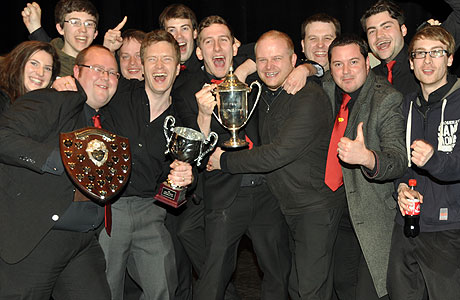
In the Zone! Zone One celebrate their first ever Area title
Picture: Paul Barker
Summing up at the end of the contest, Frank Renton gave a few pointers as to what had guided him in coming to his all important decision.
First, he spoke of the difficulty of maintaining the pace in quicker music of ‘The Devil and the Deep Blue Sea’.
He also said that it was not his job as adjudicator to have his own opinion as to how a piece should go, but that if any conductor could find a way to make it work, then that would be acceptable.
First few bars
Playing together and good intonation were vital, however, and he cited the difficulties faced by the baritones and euphoniums in the first few bars.
Regarding the fugue, it was important to play the last note of the phrase correctly so that the next phrase could begin in tempo.
Setting that right tempo was vital: too fast and it could become a scramble, too slow and it could become boring.
He had also focused his attention on the section 37-38, simple phrases for horns followed by cornets that were capable of producing a magical affect, but which too often were thrown away.
Intriguing
The contest itself was equally intriguing as Frank’s findings.
First to play were Regent Brass, a band that was perhaps a bit of a dark horse fancy, but one that didn’t quite manage to knit together a coherent structure on which to thrill with their interpretation of the Derek Bourgeois test piece.
Classy winner
Meanwhile, everything seemed to fall nicely into place for Zone One, with clean entries in the fugue, fine soprano and xylophone, and effective work in the fanfare section.
There was a feeling in the hall that here was the performance that could challenge Redbridge's dominance, and so it proved.
It was a very classy winner under the baton of Richard Ward.
Wantage displayed a lack of confidence in some of the solo and ensemble passages, although the fugue was well defined, with nice sounds from the horns and trombones. This resulted in a mid-table 7th place.
Odds on
Redbridge entered the contest tipped as the odds on favourite, and got off to a fine start under Jeremy Wise with the flugel blending in neatly with the baritone and euphonium quartet.
From that point on it never wavered in consistency.
We had them in 2nd place, and there was some consternation in the hall when it was discovered Frank Renton had only placed them 6th. Intrigue indeed.
Clacton-on-Sea Co-operative had an unconvincing opening chord, and the horn and cornet interjections were a little muddy.
The fugue was untidy, and the fanfares were not properly together, but there was a bravura show from the soprano. 11th place it was.
Strong opening
Meanwhile, East London Brass acquitted themselves pretty well, with a strong opening chord followed by some less consistent playing, whilst the fugue became rather muddy in the bottom registers.
There was some untunefulness in the cornet melody at 39, but some nice playing by solo horn, and an effective glissando before 48. 10th place was a fair outcome.
Aveley & Newham set out their stall with a powerful opening, aided by some hefty work on percussion.
Some uneven vibrato was a little distracting, but they produced a massive sound at 37, and an elegant 5/4 section. We had them 3rd, Frank 4th.
Fell away
One of Medway's cornet players fell away from the opening chord which may have proved unsettling.
The music flowed nicely, although the fanfares were a little rushed, and the soloists were nicely integrated in the 5/4, although the euphonium seemed rather over the top at 51. 5th place seemed about right.
Opened well
Friary Guildford opened well, with some neat horn interjections, and a steady build up to 5.
The fugue seemed a little garbled, but in the 5/4, the horn and flugel played with confidence and the performance ended well.
Not as full a sound as some, but good enough to break into the frame with 3rd place.
Brash
Norfolk Brass produced a rather brash opening chord, and intonation in the cornet section was a problem both in quiet and loud passages.
Fugue entries were rushed, whilst it was too frantic prior to the fanfare section. 8th place was their reward.
Neutrals
It was with Sandhurst that many neutrals had a real divergence with Frank Renton's placing, feeling that Ian McElligott had produced a well-measured reading, playing to the band's strengths, with close attention to dynamics in particular.
The fugue was a little on the slow side, but it was clear and well controlled. Soloists seemed confident and it was one of the few readings to hold a true 'lunga' pause before 48.
We felt it could have edged into the frame, but not Frank, who placed them 10th.
Wayward
Haverhill Silver suffered from wayward intonation, although the overall sound was better at higher dynamic levels.
The semiquaver passages were all rather hectic, as they finished in 13th and last place.
Dancing
Last to play were Staines Brass, benefitting from very precise direction from Melvin White, so enthusiastic he was almost dancing at one stage.
Sparkling work from soprano and solo cornets was matched by careful voicing of the chords at 14.
The fanfare section was nicely paced, and the glissando before 48 was really drawn out to good effect.
Intriguing
It was very well received in the hall and booked them the second qualification slot for the Royal Albert Hall.
It ended what proved to be an intriguing contest and a somewhat intriguing result - although there was no doubting the quality of the winners.
Peter Bale

2012 London & Southern Counties Regional Championship — Championship Section retrospective
Peter Bale looks back at the Championship Section contest in Stevenage.












